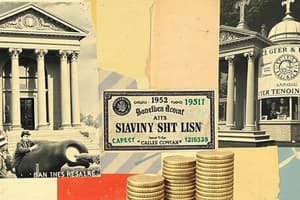Podcast
Questions and Answers
Why get an account with FDIC insurance?
Why get an account with FDIC insurance?
This insures up to $250,000 in your bank account.
How can you access your checking account?
How can you access your checking account?
Debit card, check, ATM, online transfer, physical bank location.
What is direct deposit and why is it used?
What is direct deposit and why is it used?
So your employer can pay you directly into your bank account.
How often do you get a bank statement?
How often do you get a bank statement?
Why should you check your bank statement?
Why should you check your bank statement?
How can you make your savings account secure?
How can you make your savings account secure?
Can you pay bills with a savings account?
Can you pay bills with a savings account?
What are savings accounts used to save for?
What are savings accounts used to save for?
What is an interest rate?
What is an interest rate?
Which has a higher interest rate?
Which has a higher interest rate?
Why use a checking account if savings accounts have higher interest rates?
Why use a checking account if savings accounts have higher interest rates?
List 3 banking fees.
List 3 banking fees.
Should you get an account with a maintenance fee?
Should you get an account with a maintenance fee?
How can you avoid an out-of-network ATM fee?
How can you avoid an out-of-network ATM fee?
What is the typical fee for an out-of-network ATM transaction?
What is the typical fee for an out-of-network ATM transaction?
What happens if you have overdraft protection and you overdraw from your account?
What happens if you have overdraft protection and you overdraw from your account?
What happens if you have overdraft coverage and you overdraw your account?
What happens if you have overdraft coverage and you overdraw your account?
What happens if you have no overdraft protection and you overdraw from your account?
What happens if you have no overdraft protection and you overdraw from your account?
When might it be a good idea to have overdraft protection?
When might it be a good idea to have overdraft protection?
When might it be a bad idea to have overdraft protection?
When might it be a bad idea to have overdraft protection?
Why might someone opt for overdraft protection if it is not in their best interest?
Why might someone opt for overdraft protection if it is not in their best interest?
What are 3 saving strategies we talked about in class?
What are 3 saving strategies we talked about in class?
Why save early?
Why save early?
Describe the 50/30/20 saving method.
Describe the 50/30/20 saving method.
Why put 30% (50/30/20 saving method) to wants?
Why put 30% (50/30/20 saving method) to wants?
Describe the Pay-Yourself-First saving method.
Describe the Pay-Yourself-First saving method.
What is an emergency fund used for?
What is an emergency fund used for?
Study Notes
Checking and Savings Accounts
- FDIC Insurance: Insures up to $250,000 per depositor, per insured bank. Most large banks are FDIC insured.
- Accessing Checking Accounts: Debit card, check, ATM, online transfer, physical bank location.
- Direct Deposit: Employer directly deposits your paycheck into your bank account. Avoids paper checks.
- Bank Statements: Issued monthly. Check for fraud, balance, and extra expenses.
- Savings Account Security: Use a strong password and access accounts over secure Wi-Fi.
- Savings Account Usage: Typically not used to pay bills. Savings are accumulated for long-term financial goals like a house, car, college education, vacations, etc.
- Interest Rates: Higher in savings accounts compared to checking accounts. Savings accounts generally have fewer transactions and larger deposits.
- Checking Account Benefits: Easier to access compared to limited withdrawals for savings accounts (typically 6 per month).
Beware of Banking Fees
- Maintenance Fees: Can be waived with a linked savings account or by maintaining a minimum balance, depending on the bank.
- Out-of-Network ATM Fees: Avoid by using your own bank's ATMs, prepaid debit cards while traveling, or paying with debit/credit card. Typical fee is $3 per transaction.
- Overdraft Protection: Transactions are approved even with insufficient funds, but a fee is applied. Money can be drawn from a linked account (usually savings) in increments.
Savings Strategies
- 50/30/20 Saving Method:
- 50% for needs (housing, transportation, groceries)
- 30% for wants (entertainment, dining out, hobbies)
- 20% for savings (college, retirement, emergency fund)
- Pay-Yourself-First Method: Set aside a percentage of your income for savings before paying bills or spending money.
- Emergency Fund: For unexpected expenses like medical bills, car repairs, job loss, etc.
- Multiple Savings Accounts: Categorize savings for different goals.
- Set Short, Medium, and Long-Term Goals: Visualize savings targets and monitor progress.
Why Save Early?
- Compound Interest: Money earns interest on itself. The earlier you save, the more time for exponential growth.
Additional Notes
- Perceived Choice: Giving yourself spending limits can help avoid impulse purchases. It's similar to how offering a young child two options still limits their choices and influences their decisions.
- Beware of Overdraft Protection: It can lead to debt if you don't have a consistent income. Bankers' statements about overdraft protection can be misleading.
Studying That Suits You
Use AI to generate personalized quizzes and flashcards to suit your learning preferences.
Related Documents
Description
This quiz covers key concepts about checking and savings accounts, including the benefits and features of each type. Learn about FDIC insurance, direct deposits, and the security measures necessary for maintaining a savings account. Understand how checking accounts can provide easier access for daily transactions compared to savings accounts.




